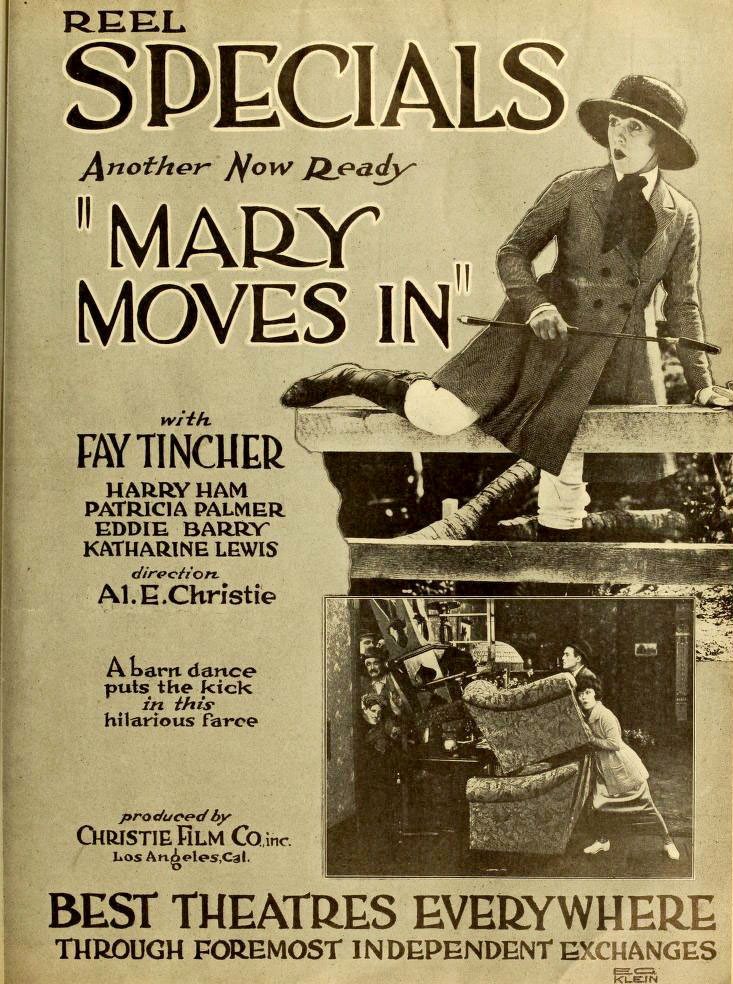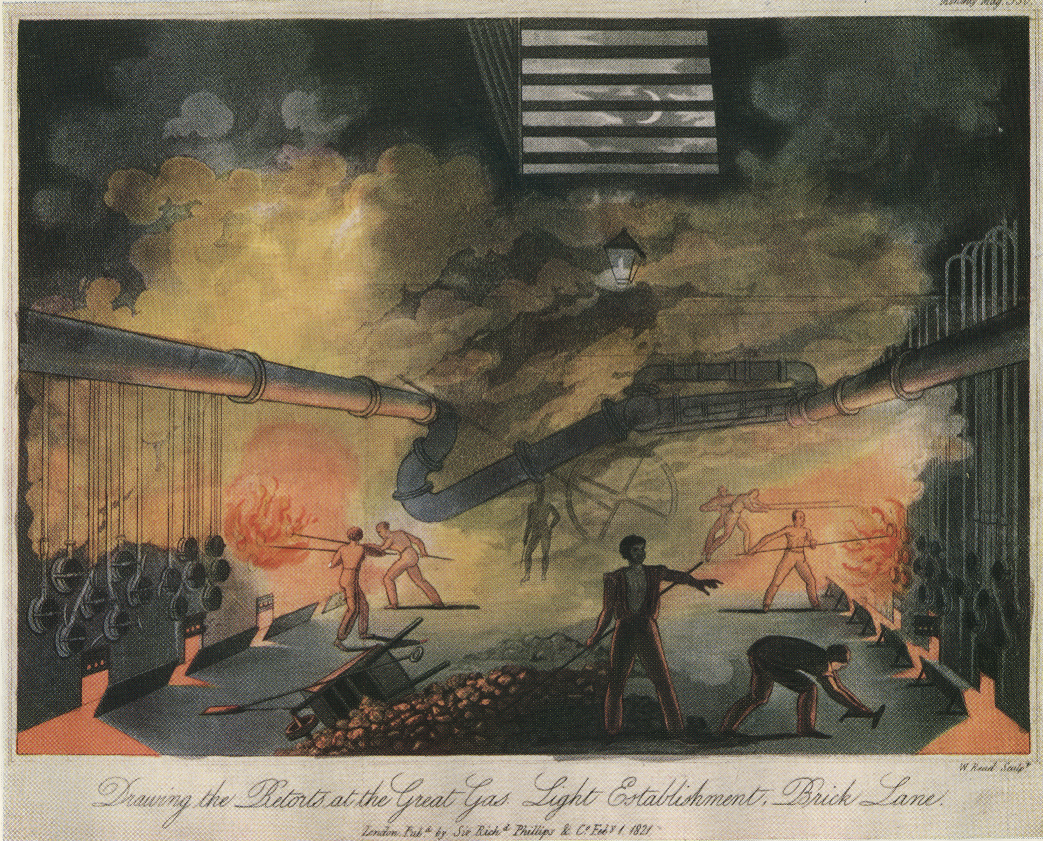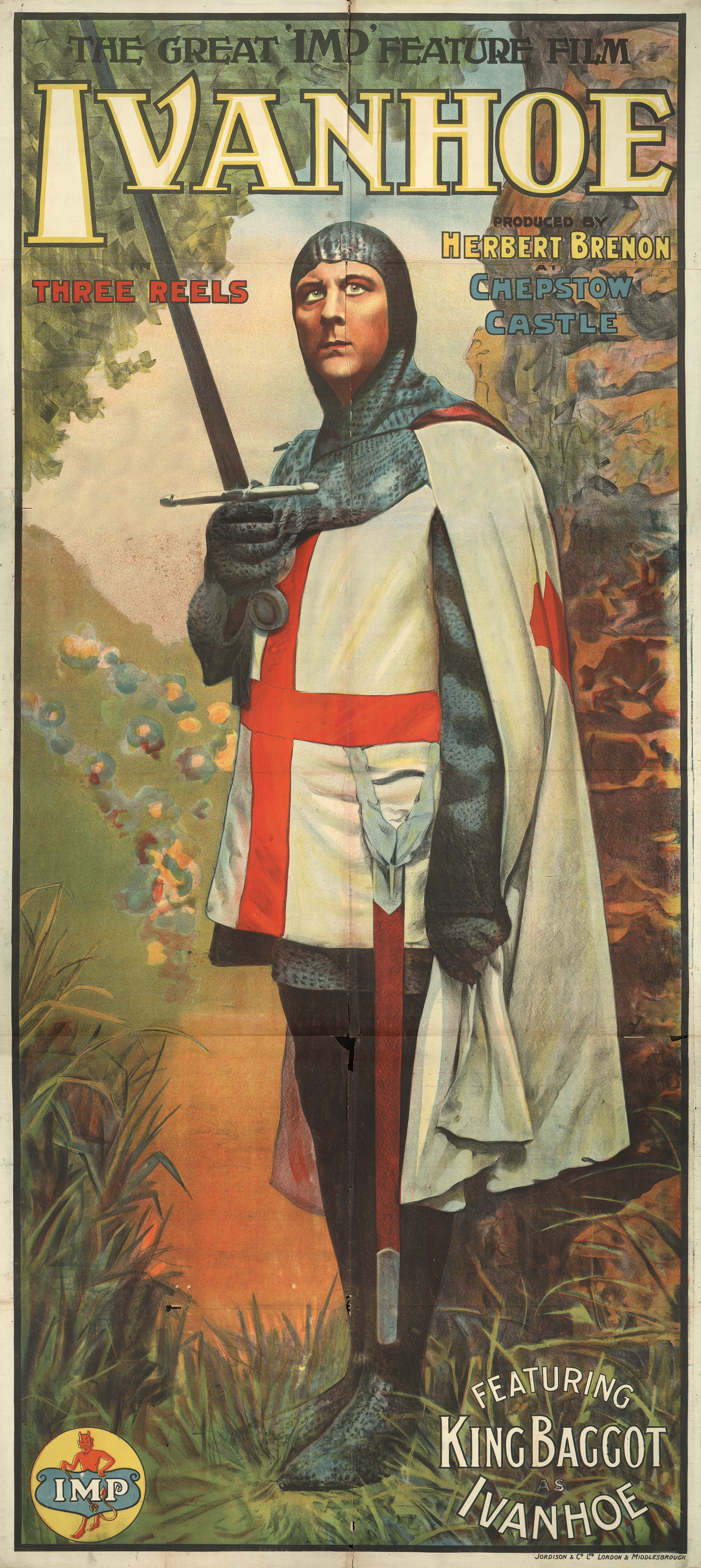|
Fay Tincher
Fay Tincher (April 17, 1884 – October 11, 1983) was an American comic actress in motion pictures of the silent film era. Early years Tincher was born in Topeka, Kansas, and was the daughter of George Tincher and Elizabeth Tincher. She had three sisters, Mary, Ruth, and Julia. Her father was mayor of Topeka and the state printer. As a child, she studied dance, elocution, and music. When she was a teenager, she attended a dramatic school in Chicago and performed in light opera there. Early career Although Tincher planned to perform in dramas, she ended up in comedy and later went into vaudeville, performing in Europe as well as in the United States. Tincher began her career on stage. In 1908 she was touring in California with ''The Merry Go Round Company''. In August of that year she may have married fellow actor, Ned Buckley, on a dare. He was a Yale graduate and a resident of Bridgeport, Connecticut. She visited her lawyer at the New York Life Insurance Building at 112-114 B ... [...More Info...] [...Related Items...] OR: [Wikipedia] [Google] [Baidu] |
Topeka, Kansas
Topeka ( ; Kansa language, Kansa: ; iow, Dópikˀe, script=Latn or ) is the Capital (political), capital city of the U.S. state of Kansas and the County seat, seat of Shawnee County, Kansas, Shawnee County. It is along the Kansas River in the central part of Shawnee County, in northeast Kansas, in the Central United States. As of the 2020 United States census, 2020 census, the population of the city was 126,587. The Topeka Topeka, Kansas metropolitan area, metropolitan statistical area, which includes Shawnee, Jackson County, Kansas, Jackson, Jefferson County, Kansas, Jefferson, Osage County, Kansas, Osage, and Wabaunsee County, Kansas, Wabaunsee Counties, had a population of 233,870 in the 2010 United States Census, 2010 census. The name "Topeka" is a Kansa-Osage word that means "place where we dig potatoes", or "a good place to dig potatoes". As a placename, Topeka was first recorded in 1826 as the Kansa name for what is now called the Kansas River. Topeka's founders chose ... [...More Info...] [...Related Items...] OR: [Wikipedia] [Google] [Baidu] |
Edward Dillon (actor)
Edward Dillon ( or 1879 – July 11, 1933) was an American actor, director and screenwriter of the silent era. He performed in more than 320 films between 1905 and 1932 and also directed 134 productions between 1913 and 1926. He was a native of New York City. Dillon's work on Broadway included acting in ''Prince Otto'' (1900), ''Francesca da Rimini'' (1901), ''The Taming of the Shrew'' (1905), and ''The Ranger'' (1907). He left the stage to begin acting in films in 1908, working under D. W. Griffith at Biograph. He was Mary Pickford's first leading man, and he was instrumental in Fay Tincher's developing into a star. Dillon died on July 11, 1933, at the age of 60 in Hollywood, California from a heart attack. His brother John T. Dillon was also an actor. Selected filmography Actor * '' Bobby's Kodak'' (1908, Short) - Father * '' When Knights Were Bold'' (1908) *short * ''The Fight for Freedom'' (1908, Short) - Man in Bar / Member of the Posse * '' The Kentuckian'' (190 ... [...More Info...] [...Related Items...] OR: [Wikipedia] [Google] [Baidu] |
Illuminating Gas
The history of gaseous fuel, important for lighting, heating, and cooking purposes throughout most of the 19th century and the first half of the 20th century, began with the development of analytical and pneumatic chemistry in the 18th century. The manufacturing process for "synthetic fuel gases" (also known as "manufactured fuel gas", "manufactured gas" or simply "gas") typically consisted of the gasification of combustible materials, usually coal, but also wood and oil. The coal was gasified by heating the coal in enclosed ovens with an oxygen-poor atmosphere. The fuel gases generated were mixtures of many chemical substances, including hydrogen, methane, carbon monoxide and ethylene, and could be burnt for heating and lighting purposes. Coal gas, for example, also contains significant quantities of unwanted sulfur and ammonia compounds, as well as heavy hydrocarbons, and so the manufactured fuel gases needed to be purified before they could be used. The first attempts to manufa ... [...More Info...] [...Related Items...] OR: [Wikipedia] [Google] [Baidu] |
Bequest
A bequest is property given by will. Historically, the term ''bequest'' was used for personal property given by will and ''deviser'' for real property. Today, the two words are used interchangeably. The word ''bequeath'' is a verb form for the act of making a bequest. Etymology Bequest comes from Old English ''becwethan'', "to declare or express in words" — cf. "quoth". Interpretations Part of the process of probate involves interpreting the instructions in a will. Some wordings that define the scope of a bequest have specific interpretations. "All the estate I own" would involve all of the decedent's possessions at the moment of death. A ''conditional bequest'' is a bequest that will be granted only if a particular event has occurred by the time of its operation. For example, a testator might write in the will that "Mary will receive the house held in trust if she is married" or "if she has children," etc. An ''executory bequest'' is a bequest that will be granted only if ... [...More Info...] [...Related Items...] OR: [Wikipedia] [Google] [Baidu] |
Sam Newfield
Sam Newfield, born Samuel Neufeld, (December 6, 1899 - November 10, 1964), also known as Sherman Scott or Peter Stewart, was an American B-movie Film director, director, one of the most prolific in American film history—he is credited with directing over 250 feature films in a career which began during the silent era and ended in 1958. In addition to his staggering feature output, he also directed one -and two-reel comedy Short film, shorts, training films, industrial films, TV episodes and pretty much anything anyone would pay him for. Because of this massive output—he would sometimes direct more than 20 films in a single year—he has been called the most prolific director of the sound era. Many of Newfield's films were made for Producers Releasing Corporation, PRC Pictures. This was a film production company headed by his brother Sigmund Neufeld. The films PRC produced were low-budget productions, the majority being Western (genre), westerns, with an occasional horror fil ... [...More Info...] [...Related Items...] OR: [Wikipedia] [Google] [Baidu] |
Sidney Smith (The Gumps)
Robert Sidney Smith (February 13, 1877 – October 20, 1935), known as Sidney Smith, was the creator of the influential comic strip ''The Gumps'', based on an idea by Captain Joseph M. Patterson, editor and publisher of the ''Chicago Tribune''. Biography He was born in Bloomington, Illinois. The son of a dentist, Smith never finished high school and began drawing cartoons for his hometown newspaper when he was 18. He also delivered chalk talks and worked in newspaper art departments in Indiana, Pennsylvania and Ohio. In 1908, he signed on as a sports cartoonist at the '' Chicago Examiner'' where he created a talking goat in a feature, ''Buck Nix'', which involved continuity: "What will tomorrow bring?" In 1911, Smith moved to the ''Chicago Tribune'', where he introduced a new goat character when ''Old Doc Yak'' began as a daily on February 5, 1912, with the Sunday page starting a month later on March 10. In either 1912 or early 1913 he began creating "Old Doc Yak" animated f ... [...More Info...] [...Related Items...] OR: [Wikipedia] [Google] [Baidu] |
Universal Pictures
Universal Pictures (legally Universal City Studios LLC, also known as Universal Studios, or simply Universal; common metonym: Uni, and formerly named Universal Film Manufacturing Company and Universal-International Pictures Inc.) is an American film production and distribution company owned by Comcast through the NBCUniversal Film and Entertainment division of NBCUniversal. Founded in 1912 by Carl Laemmle, Mark Dintenfass, Charles O. Baumann, Adam Kessel, Pat Powers, William Swanson, David Horsley, Robert H. Cochrane, and Jules Brulatour, Universal is the oldest surviving film studio in the United States; the world's fifth oldest after Gaumont, Pathé, Titanus, and Nordisk Film; and the oldest member of Hollywood's "Big Five" studios in terms of the overall film market. Its studios are located in Universal City, California, and its corporate offices are located in New York City. In 1962, the studio was acquired by MCA, which was re-launched as NBCUniversal in 2004. ... [...More Info...] [...Related Items...] OR: [Wikipedia] [Google] [Baidu] |
Joe Murphy (actor)
Joseph Murphy (1877–1961) was an American comic stage actor. He went on to become a silent film actor, notably playing Andy Gump in the shorts The Gumps during the mid-1920s. His unusual tall, thin stature and extraordinary facial features were instantly recognizable. Personal life Joe Murphy was born Joseph J. Murphy on 16 May 1877 in San Jose, California. His mother Anna (Mahoney) and father John Murphy were married in Michigan, January 13, 1875 before moving to San Jose, California. On October 30 ,1920, his son Russell, aged 16, was shot and killed by a police officer after he and is friends were mistaken for robbers. Murphy filed a $18,000 lawsuit against a patrolman of the L.A. Police Department, after criminal charges against the police were dropped by the district attorney claiming that the officer killed the boy in the line of duty. Joe continued to live in California where he worked as a silent moving picture star in Hollywood. He died at the age of 84 on 31 July 1961 ... [...More Info...] [...Related Items...] OR: [Wikipedia] [Google] [Baidu] |
World Film Company
The World Film Company or World Film Corporation was an American film production and distribution company, organized in 1914 in Fort Lee, New Jersey. Short-lived but significant in American film history, World Film was created by financier and filmmaker Lewis J. Selznick in Fort Lee, where many early film studios in America's first motion picture industry were based in the early part of the 20th century. Formation World Film was to be the distribution arm for three main production companies: Selznick's own production company called Equitable Pictures, Jules Brulatour's Peerless Pictures, and the Shubert Pictures production company founded by the strong-willed promoter and entrepreneur William Aloysius Brady. Under this arrangement, World Film was the distributor for some 380 short films and features from 1914 through 1921. It also became a production company, with filming centered at Brulatour's Peerless Studio facilities, and run by Brady. The Schuberts intended to use the ... [...More Info...] [...Related Items...] OR: [Wikipedia] [Google] [Baidu] |
Photoplay
''Photoplay'' was one of the first American film (another name for ''photoplay'') fan magazines. It was founded in 1911 in Chicago, the same year that J. Stuart Blackton founded '' Motion Picture Story,'' a magazine also directed at fans. For most of its run, ''Photoplay'' was published by Macfadden Publications. In 1921 ''Photoplay'' established what is considered the first significant annual movie award. The magazine ceased publication in 1980. History ''Photoplay'' began as a short fiction magazine concerned mostly with the plots and characters of films at the time and was used as a promotional tool for those films. In 1915, Julian Johnson and James R. Quirk became the editors (though Quirk had been vice president of the magazine since its inception), and together they created a format which would set a precedent for almost all celebrity magazines that followed. By 1918 the circulation exceeded 200,000, with the popularity of the magazine fueled by the public's increasing inte ... [...More Info...] [...Related Items...] OR: [Wikipedia] [Google] [Baidu] |
Tully Marshall
Tully Marshall (born William Phillips; April 10, 1864 – March 10, 1943) was an American character actor. He had nearly a quarter century of theatrical experience before his debut film appearance in 1914 which led to a film career spanning almost three decades. Early years Marshall was born in Nevada City, California. He attended private schools and Santa Clara College, from which he graduated with an engineering degree. ) Stage Marshall began acting on the stage at 19, appearing in ''Saratoga'' at the Winter Garden in San Francisco on March 8, 1883. He played a wide variety of roles on Broadway from 1887. His Broadway credits include ''The Clever Ones'' (1914). For several years, Marshall played with a variety of stock theater troupes, including both acting and being stage manager for E. H. Sothern's company. Film In 1914, Marshall arrived in Hollywood. His screen debut was in '' Paid in Full'' (1914). By the time D. W. Griffith cast him as the High Priest of Bel in ' ... [...More Info...] [...Related Items...] OR: [Wikipedia] [Google] [Baidu] |
Keystone Film Company
Keystone Studios was an early film studio founded in Edendale, California (which is now a part of Echo Park) on July 4, 1912 as the Keystone Pictures Studio by Mack Sennett with backing from actor-writer Adam Kessel (1866–1946) and Charles O. Baumann (1874–1931), owners of the New York Motion Picture Company (founded 1909). The company, referred to at its office as The Keystone Film Company, filmed in and around Glendale and Silver Lake, Los Angeles for several years, and its films were distributed by the Mutual Film Corporation between 1912 and 1915. The Keystone film brand declined rapidly after Sennett went independent in 1917. The name ''Keystone'' was taken from the side of one of the cars of a passing Pennsylvania Railroad train (Keystone State being the nickname of the Commonwealth of Pennsylvania) during the initial meeting of Sennett, Kessel and Baumann in New York. The original main building, the first totally enclosed film stage and studio in history, is still ... [...More Info...] [...Related Items...] OR: [Wikipedia] [Google] [Baidu] |






